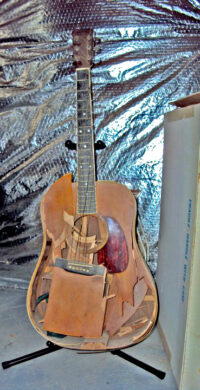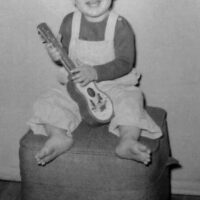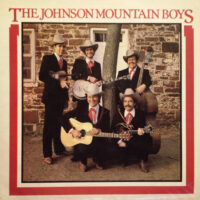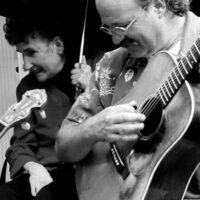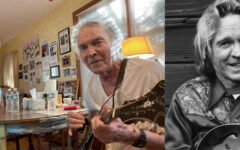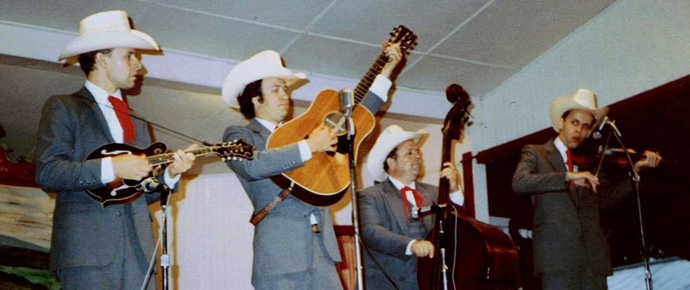
Dudley Connell with The Johnson Mountain Boys playing his D-28 – photo by Peggy Detweiler
Dudley Connell is best known for playing with two important Washington, DC bands – The Johnson Mountain Boys and The Seldom Scene. In a recent interview he shared this story about the instruments he’s played with those bands.
DC: I saw a guitar for sale in The Washington Post. It was a Martin D-35. This was sometime in the mid-’70s. I had learned to play guitar on a fairly inexpensive Japanese copy of a Martin. I wanted a Martin so bad. At that time I didn’t know the difference between a D-28 and a D-35.
KD: What is the difference?
DC: The difference is a D-35 has a three-piece back and a D-28 has a two-piece back. So I saw this guitar advertised in The Washington Post. The seller was in Germantown, Maryland and a friend of mine and I went up there. Turns out I was buying it from a Catholic priest. When I asked him why he was selling it, he told me that he played it Sundays at Mass and he was embarrassed to ask for money when he was sitting there playing an expensive guitar. He decided to get rid of it and buy something cheaper so he could feel more comfortable with his congregation. So I bought the guitar.
KD: What did you pay for it, do you recall?
DC: $550.
KD: I don’t know anything about guitars so I don’t know if that was a good price.
DC: I think it was the going rate for a nice guitar. That was the first good guitar I ever owned. I played that guitar on the first JMB (Johnson Mountain Boys) record. This was very early in the JMB days.
We used to play New England a lot because we were recording for Rounder Records. And, Katy, we were just trying to get our name out. We would play just about anywhere for any price. One of the gigs we played was a benefit for Rounder Records at Amherst, at the college up there.
We were to back Hazel Dickens in a number. Tony Trischka and Skyline where there and a bunch of different Rounder acts. I think David (McLaughlin) and Eddie (Stubbs) had gone into the venue. It was really loud. It was a college town and a little bit wide open. Unbeknownst to me, there was a real rivalry between the townies, the people who actually lived there, and the college kids, who the townies thought were all rich.
Richard (Underwood) and I were tuning up in a gravel parking lot when a Jeep pulled up. Four guys got out, walked up to us and asked: “Which one of you guys gave us the finger?” Well, no one had. We hadn’t even noticed them. One of the guys started to turn around and said, “I’m sorry I just can’t believe that.” He turned back around and took a swing at me. When he did I turned to defend myself and his punch hit my guitar between the bridge and the end pin. The whole guitar collapsed into itself. From the very top where the neck connects to the very end of the guitar, it just fell in. When that happened they took Richard’s banjo. I don’t remember if it was in the case or not. They threw it over the Jeep as they were walking away. They got into the Jeep and took off. We were able to get the tag number and we called the police.
We didn’t play the show that night. We went back to the hotel and filled out police forms. We sued the guy who actually did this, but apparently his dad was well connected and they ended up buying me a new case. I never did fix the guitar. It’s still hanging around somewhere.
KD: What about Richard’s banjo?
DC: It broke the head but the banjo itself was fine. We were the first day out on a week’s tour. Someone from a local music store took pity on me and loaned me a D-28 which I used for the tour and then returned it as we came back through town.
KD: What did you do about a guitar? You had a new case…
DC: Chris Warner, who was a powerful banjo player and who played for a long time with Jimmy Martin, had a music shop in York or Hanover, Pennsylvania called Warner’s String Works. I went up to him and said, “I need a guitar. This is what happened and I’m looking for a new guitar.” He had a ’72 or ‘74 Martin D-28 hanging on the wall. I bought that and I played it for a few years until I found my old Herringbone in 1983, which I still play. I still have that guitar I bought from Chris.
How I ended up with my Herringbone is that I saw all these pictures of Carter Stanley, Lester Flatt and Jimmy Martin and they all had these guitars called Herringbones. I didn’t know what that was but I knew I had to have one of those if I was going to be a professional bluegrass musician.
KD: What does Herringbone mean?
DC: It’s the trim around the top. If you’re looking down on the guitar, the binding around the outside between the spruce and the rosewood, there’s a thing called binding. It’s a trim in a Herringbone design.
KD: Sorry, continue with the story of how you bought one.
DC: We live in a very small community so I put the word out that I was looking for an old guitar. We were at a bluegrass festival in Burlington, North Carolina. A few guys came out with three guitars. We were going to New York the next day to play a folk festival and then we would be coming back through Burlington in a couple weeks. This man said “Just take the guitar with you and see if you like it.” That was a smart move on his part and a smart move on my part, too. I ended up buying the guitar and playing it all night long and taking it to New York.
Then it was up to me to figure out how to pay for it. He was asking for $4,000, which was about $3,500 more than I had to my name at that time. That was in 1983.
KD: These are from the days when you were eating bologna out of a cooler during your JMB road trips.
DC: (laugh) Something like that. I remember borrowing $1,000 from my dad and I think I borrowed a couple thousand from my local bank. It was a very small town bank. They knew me and what I was up to and what I was about so they gave me a loan.
I’ve played that guitar ever since.

